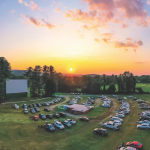The rehearsal facility has been the quiet link in the touring chain for decades, though like the late Rodney Dangerfield, they rarely get the respect they deserve. And like most other components in the industry, larger forces are reshaping their business terrain. From the top-tier through the middle of the market, rates are feeling downward pressures. However, a greater diversity of services is the counterstrategy that seems to be working well in many cases. The touring market is becoming increasingly pyramid-shaped: a smaller group of artists are able to predictably mount successful large-scale tours; however, a greater number of artists, driven by the new paradigm of independent labels, are predicating a larger share of their revenues on live performances. This dynamic is being felt in the rehearsal studio sector. Typical of any commoditization, the overall market needs more space at lower rates.
"As much as we'd truly like to raise rates, it's just not possible right now," comments Laura Bartsche, general manager of Studio Instrument Rentals' Nashville location. "It's a combination of competition and what the market is willing to pay, which is less because so many more artists are on independent labels or their own labels. Even some of the better-known bands will go into garages if they think a studio costs too much money." Bartsche adds that some of the top acts will more often use one of the facility's smaller rooms to rehearse song arrangements before shifting to an arena or a shed to work out staging and sound systems needs.
Commodification doesn't necessarily benefit those positioned to service the middle parts of a tier. Just ask any airline–even Southwest missed its numbers one quarter last year. Mike Nightingale, who has operated Nightingale Studios for 15 years and now has nearly 20,000 square feet of space between two locations in North Hollywood and Burbank, which have been used by artists including David Lee Roth and System of a Down, has seen more activity centered on his smaller rooms. "Bands back in the day would fork over $2,000 a day for a decked-out room," he says. "Independent bands can't do that–they're on smaller labels and often self-fund their tours. It's a mirror image of what's gone on in the recording studio business: it's gotten smaller and more do-it-yourself-oriented."
Nightingale's response is interesting: he's built a control room that connects to several of his rehearsal spaces and installed a Pro Tools system, offering recording services. He says this hasn't put him in opposition to L.A.'s base of recording studios, many of which he says have shuttered anyway as the recording business moves deeper into personal spaces. "We'll often have a band rent the space for three hours just to cut their drum tracks, then go back to their project studios," he explains. He's also trying a unique retail tack, building relationships with emerging musical instrument and P.A. suppliers, like locally based Basson Sound, which makes speaker cabinets, allowing them to use the studio as a demo showcase and marketing tool. "We'll offer those instead of Marshall cabinets, for instance," he says. "It's another way to differentiate ourselves."
At Soundcheck, Nashville's largest rehearsal facility with 100,000-plus square feet, owner Ben Jumper, who bought the facility from Eagles band member Glenn Frey and partners last July, says business is good, but that it's driven in part by a strategy that includes turning the facility into a kind of retail mothership, a landlord hosting tenants with related businesses, including Crew One (of which Jumper is a principal), video producer Moo TV and trucking and staging firms. "It helps increase traffic flow," he says. "Everyone is struggling to maintain rates–this has become a dollar-driven industry, not a relationship-driven one like it used to be." Still, Jumper plans to build two new 150-by 100-by 80-foot soundstages this year complete with riggable ceilings, and plans to market the facility to larger artists outside Nashville, touting the city's lower hotel and amenity costs.
What rehearsal studios have going for them is the Einsteinian notion of time and space–the one thing that Tascam and KORG haven't been able to digitize and put in a box for $199. "Bands are still going to play live, and they can only take it so far in a neighborhood garage or a rented warehouse," observes Mike Nightingale. "They'll always need a professional space."



